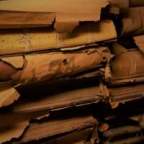×
Questions concerning iron and steel, steel making, rod rolling, galvanizing, springs, nails, fencing, and patenting go here.
Chevron fracture( cup and cone ) of steel
- Archived Forum Admin
-
 Topic Author
Topic Author
- Offline
- Platnium Boarder
-

Less
More
13 years 5 months ago #1163
by Archived Forum Admin
Chevron fracture( cup and cone ) of steel was created by Archived Forum Admin
Dear All,
How can we decrease the formation of cup and cone type fracture of steel wire?
Best regards.
murat
Murat
How can we decrease the formation of cup and cone type fracture of steel wire?
Best regards.
murat
Murat
Please Log in to join the conversation.
- Archived Forum Admin
-
 Topic Author
Topic Author
- Offline
- Platnium Boarder
-

13 years 5 months ago #1164
by Archived Forum Admin
Replied by Archived Forum Admin on topic Re: Chevron fracture( cup and cone ) of steel
You should select right approach angle of your drawing die according to material and reduction of area. Can you tell me type of steel,size, strength and reduction of area of each pass?
This email address is being protected from spambots. You need JavaScript enabled to view it.
This email address is being protected from spambots. You need JavaScript enabled to view it.
Please Log in to join the conversation.
- Archived Forum Admin
-
 Topic Author
Topic Author
- Offline
- Platnium Boarder
-

13 years 5 months ago #1165
by Archived Forum Admin
Replied by Archived Forum Admin on topic Re: Chevron fracture( cup and cone ) of steel
Our raw material is 0,65 to 0,80 C wire rod strength 180 to 220 kg/mm2 area reduction 15 to 25 % for each pass.
thanks.
murat
Murat
thanks.
murat
Murat
Please Log in to join the conversation.
- Archived Forum Admin
-
 Topic Author
Topic Author
- Offline
- Platnium Boarder
-

13 years 5 months ago #1166
by Archived Forum Admin
Replied by Archived Forum Admin on topic Re: Chevron fracture( cup and cone ) of steel
Fractures of this nature should not occur during wire drawing at all.
There are several reason for the fractures:
1.- Bad Rods ( Inadecuate control cooling ,bad surface quality, pipes,posible segragations )
2.- Over draft very high total reduction of area.
3.- Inadecuate die profile
4.- Inadecuate flow of lubricant in the die
5.- Inadecuate lubricant
By having right these elements, fractures should not occur
Eduardo Anaya
Senior Consultant
INDEPA S.C.
Mexico City
Tel(011-52)555-407-7451
This email address is being protected from spambots. You need JavaScript enabled to view it.
There are several reason for the fractures:
1.- Bad Rods ( Inadecuate control cooling ,bad surface quality, pipes,posible segragations )
2.- Over draft very high total reduction of area.
3.- Inadecuate die profile
4.- Inadecuate flow of lubricant in the die
5.- Inadecuate lubricant
By having right these elements, fractures should not occur
Eduardo Anaya
Senior Consultant
INDEPA S.C.
Mexico City
Tel(011-52)555-407-7451
This email address is being protected from spambots. You need JavaScript enabled to view it.
Please Log in to join the conversation.
- Archived Forum Admin
-
 Topic Author
Topic Author
- Offline
- Platnium Boarder
-

13 years 5 months ago #1167
by Archived Forum Admin
Replied by Archived Forum Admin on topic Re: Chevron fracture( cup and cone ) of steel
My recommendation:
13-14 degree approach angle For 20-25% reduction
12 degree for 17-19%
10-11 degree for 15-16%
The contact point in approach angle should be approximately in half length of approach angle.
If you material have serious problem of segregation which can be verified by cementite network, the wire will be difficult to draw.
This email address is being protected from spambots. You need JavaScript enabled to view it.
13-14 degree approach angle For 20-25% reduction
12 degree for 17-19%
10-11 degree for 15-16%
The contact point in approach angle should be approximately in half length of approach angle.
If you material have serious problem of segregation which can be verified by cementite network, the wire will be difficult to draw.
This email address is being protected from spambots. You need JavaScript enabled to view it.
Please Log in to join the conversation.
Moderators: Peter J Stewart-Hay, Eduardo Anaya, Peter M Power
Time to create page: 0.073 seconds





 How to resolve AdBlock issue?
How to resolve AdBlock issue?